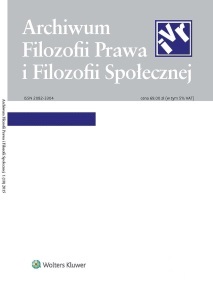Dialog personalistyczny a poznanie prawa naturalnego
Personalistic dialogue and cognition of natural law
Author(s): Michał BarańskiSubject(s): Philosophy of Law, Philosophy of Law
Published by: Stowarzyszenie Filozofii Prawa i Filozofii Społecznej – Sekcja Polska IVR
Keywords: personalistic introspection; personalistic dialogue
Summary/Abstract: The article concerns cognition of natural law in the process of personalistic introspection and personalistic dialogue. The author points out that the negation of metaphysics that was established in modernity, achieving its zenith in the post-modern thought, leads as a result to alienation of a human being, not only in the sphere of his work, but in his whole spiritual sphere. In this context dialogical philosophy was only a partial answer to these problems, being born out of religious (Buber, Rosenzweig) or anti-totalitarian inspirations (Levinas). This philosophy is not based upon personalistic anthropology which would enable to go from being to obligation, i.e. from cognition of a human being to specifying his ethical vocation and his natural law aims. In the author’s opinion it was Karol Wojtyła in the middle of the 20th century who built the foundations of the new personalistic concept of ethics and natural law through a modern phenomenological and psychological approach of human experience. This concept was rooted in the classical tradition, but it exceeded this tradition at the same time. In the author’s opinion only the full approach of human experience which means spiritual, axiological, ethical and natural law experience through self cognition (personalistic introspection) and cognition of other people (personalistic dialogue) in all spheres of a person (intellectual – spiritual, somatic and emotional) gives a possibility for human cooperation in building a common good.
Journal: Archiwum Filozofii Prawa i Filozofii Społecznej
- Issue Year: 15/2017
- Issue No: 2
- Page Range: 5-12
- Page Count: 8
- Language: Polish

